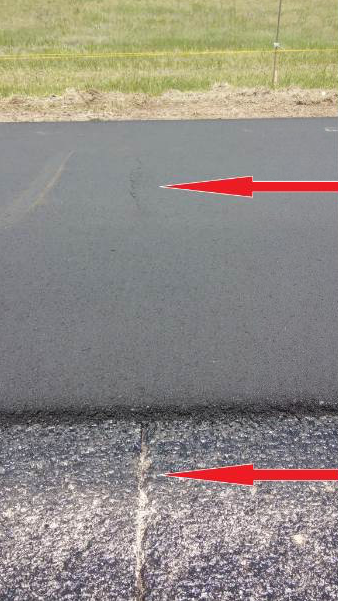Take Consistent Quality Control
BY Jarrett Welch


Afternoon rain storms had been a common event leading up to the paving date for this I-70 project in Colorado. The existing concrete surface was saturated where water had infiltrated the expansion joints, shown by the lower arrow here. During mix production, results of the material tests varied, and during placement of the new asphalt pavement, compaction proved difficult. Moisture was at the root of the problem where the mat was shoved under the roller drums, which caused the cracking shown by the upper arrow here. The crew resolved the issue by testing the asphalt mix until they had it right and consistent.
At the height of the construction season, we produce and place millions of tons of asphalt throughout the Americas. During this hectic time of year we rely on the Quality Control/Quality Assurance (QC/QA) personnel to identify and correct any issues at hand. They have the knowledge of the processes and materials, and access to data obtained in testing the processes and materials, to help us take corrective action if there’s any deviation from standards.
Many projects today have specs for payment that penalize the contractor for deviating from standards during construction. Some of these specs also allow for bonuses based on achieving quality. The penalties can add up quickly when issues arise and are not identified and corrected immediately. Sometimes in the world of asphalt the issues are not an easy find. Correcting them may take some time.
Let’s take a look at how to take some stress and pressure away from the producer by saving a bit of time with troubleshooting. More often than not, the issues taking place are related to inconsistency in the operations or inconsistency in the materials.
You should always follow best practices, and the key in maintaining a quality operation is based on that consistency. Each member involved in the operation needs to make the effort to be consistent in his or her good practices day in and day out, even when ambient conditions fluctuate.
On a project located on Interstate 70 in eastern Colorado, a crew I assisted encountered issues at the start of the project. Afternoon rain storms had been a common event leading up to the paving date. Stockpiles were saturated, as was the existing concrete surface where water had infiltrated the expansion joints.
During mix production, results of the material tests varied. During placement of the new asphalt pavement, compaction proved difficult. The mix pushed and shoved under the drums of the rollers causing cracking, which ultimately hindered the compaction.
Moisture was at the root of the issues and no roller pattern changes could get the required compaction. We had to get a consistent, dry mix and a consistent rolling pattern. It took five trials to dial the mixture in, both at the plant and in the field. It wasn’t until each member of the team started to focus on his piece of the puzzle that consistency happened.
Unfortunately for the contractors involved, they were charged more than $20,000 in disincentives during that time. Fortunately for the end users, the issues were resolved for a consistent, quality ride.
Consistency is defined as “unchanging in achievement or effect over a period of time.” Considering that, from the time the first rock is crushed to pulling the final roller off of the mat, team members need to focus on quality and consistency throughout each stage.
During the crushing and screening process, QC should collaborate with the aggregate production folks to set targets for production that will provide for a consistent run of material that meets gradation tolerances. QC should also test the other physical characteristics of the material, including the specific gravity and absorption values.
Identify areas in the pit or quarry where characteristics of the material are changing to assist in developing a strategy to handle the material appropriately for consistency. Having material produced and tested for uniformity will support the downstream processes in their respective roles.
Once aggregate production and QC have dialed in the mineral products, mix design testing will need to be performed.
Attaining the specified criteria for air voids, voids in mineral aggregate, strength and durability of an asphalt mix during the design process can be tricky, but mix designs are developed with ease of production, workability for crews and meeting performance criteria in mind. The plant operator is responsible for bringing those characteristics of the mix design to life.
Production at the asphalt plant is crucial in maintaining the consistency we desire. Loader operators should be in tune with the materials they are feeding by assuring their homogeneity through best practices. The plant operator is critical to continuing the effort by timing the feed rates to ensure smooth start-ups and mix switches. Once the plant fires and reaches the desired production temperature, it should be sustained as much as possible through the entire run.
QC personnel again are going to be involved by obtaining moistures in the aggregate stockpiles for accurate plant control, and performing additional process control testing such as asphalt contents, gradations, and volumetric analysis at specified intervals to assure the asphalt mix complies with the approved mix design.
QC performing this testing in a timely manner and relaying the information to the plant will assist in making adjustments necessary to maintain a level of control conducive to providing good quality asphalt.
Then the plant operator and paving superintendent need to have a good open line of communication so production targets can be set and maintained. These two stages need to be in tandem, both targeting the tons per hour for balance.
Compaction is the single most important factor that affects the ultimate performance of the asphalt pavement. Thus the consistent performance of roller operators is vital in the compaction process. Their efforts will reveal how each of the rest of us performed throughout the stages.
These examples are just a few of the many considerations that we need to take into account when setting ourselves up for providing a quality pavement to the traveling public. Quality control alone does not determine if we have a quality product. It takes every individual that performs a task in the process to do his or her job consistently with a focus on quality. Henry Ford said: “Coming together is a beginning; keeping together is progress; working together is success.”
Jarrett Welch is the proprietor of Quality Paving Consultants, Wheat Ridge, Colo. For more information, contact him at (970) 361-1525.
